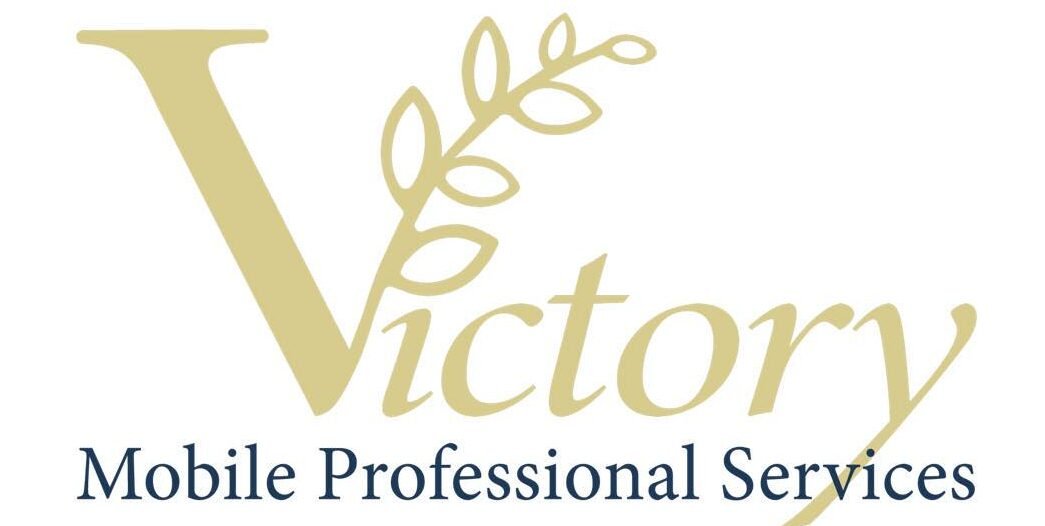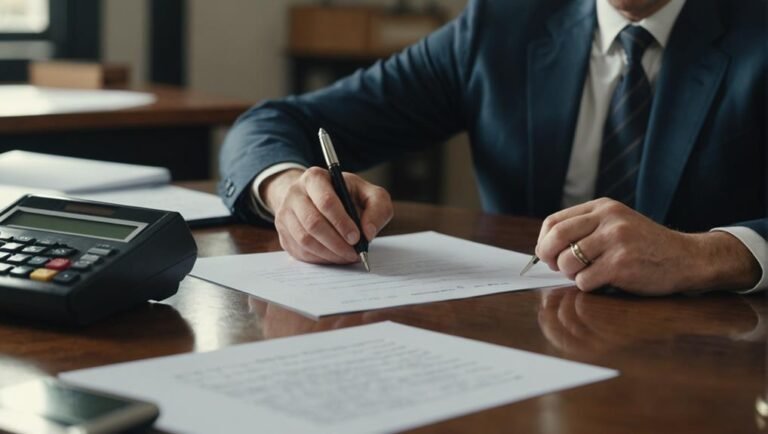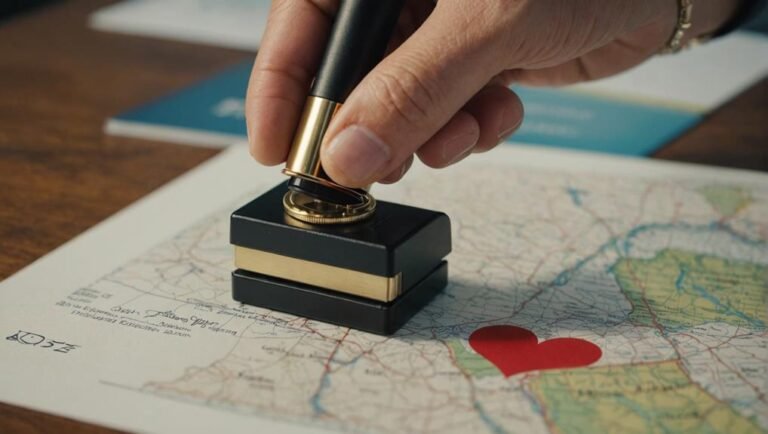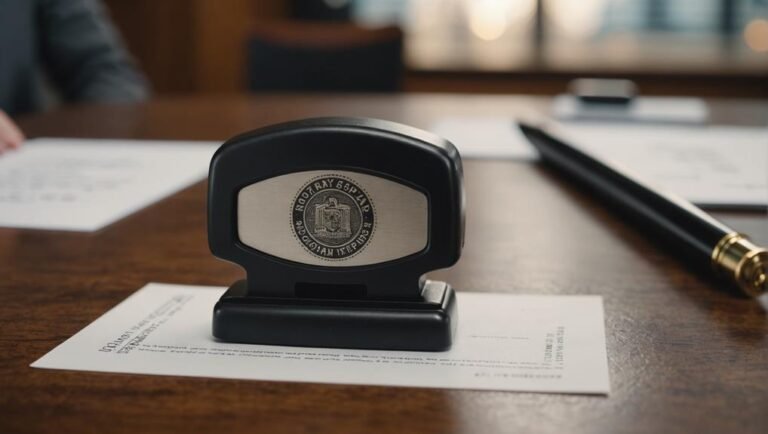In Florida, you cannot notarize your own documents. This rule maintains professionalism and ethical standards by ensuring the fairness and trustworthiness of notarial acts. Uphold the principles of neutrality by avoiding self-notarization to keep the process unbiased and reliable.
Key Takeaways
- Prohibited in Florida to maintain impartiality and prevent conflicts of interest.
- Upholding integrity and neutrality of notarial acts is essential.
- Notary's role is to verify authenticity and remain unbiased.
- Self-notarization violates principles of impartiality and neutrality.
- Legal implications include compromising document validity and integrity.
Prohibited Self-Notarization in Florida
Why is self-notarization prohibited in Florida?
Self-notarization is disallowed in Florida to uphold the integrity, impartiality, and neutrality of notarial acts. Notaries are entrusted with the responsibility of confirming the authenticity of documents and ensuring that all parties involved are acting in good faith. Allowing notaries to notarize their own documents could create conflicts of interest, potentially compromising the validity of the notarization process. By strictly prohibiting self-notarization, Florida law upholds the fundamental principles of impartiality and neutrality that are necessary in the notarial profession.
The prohibition against self-notarization serves to reinforce the importance of notaries acting as unbiased third parties in the verification of documents. Violating this ban can have serious ethical and legal consequences for notaries in Florida, as it undermines the trust and reliability of notarial acts. Hence, it's essential for notaries to adhere to this prohibition to uphold the standards of professionalism and integrity in their practice.
Notary's Role in Document Verification
Ensuring the authenticity of documents through meticulous verification is an important aspect of a notary's role in document verification. Upholding neutrality and impartiality, notaries play a pivotal role in notarizing documents in Florida. By adhering to notary ethics and Florida law, notaries maintain the integrity and validity of notarized documents.
The neutrality of a notary is paramount to guarantee the authenticity and legality of important paperwork. Notaries are entrusted with the responsibility of verifying and certifying signatures, identities, and the genuineness of documents. Their impartiality is a cornerstone of the notarial act, ensuring that notarized documents hold legal weight and can be relied upon.
Florida law prohibits notaries from notarizing their own signatures to prevent conflicts of interest and to preserve the integrity of the notarial process.
Importance of Third-Party Notarization
Have you ever wondered about the key role that third-party notarization plays in upholding the authenticity and validity of documents?
In Florida, third-party notarization is essential for ensuring document integrity and authenticity. Third-party notaries are necessary for maintaining impartiality, a cornerstone of notary ethics and a requirement for notarial acts.
Impartiality serves as a safeguard against fraud, guaranteeing that documents are genuine and accurate.
Notary Public Integrity Principles
Maintaining integrity is a fundamental principle for notaries public in Florida. As a Notary Public, you play a pivotal role in certifying the authenticity of documents and ensuring the identity of the person signing them.
It's essential to understand that as a notary public, you must remain impartial and neutral when performing notarial acts. This means that you can't notarize your own signature or any document in which you're a part of, as it would compromise the integrity of the notarization process.
Florida law explicitly prohibits notaries from notarizing their own signatures to prevent conflicts of interest and uphold the public's trust in the validity of notarized documents.
Legal Implications of Self-Notarization
Notarizing your own documents in Florida carries significant legal implications that can impact the validity and integrity of the notarization process. Self-notarization is explicitly prohibited in Florida to uphold notary ethics and maintain impartiality. Notaries are bound by the principle of neutrality, preventing them from notarizing their own signatures to ensure document authenticity.
By refraining from notarizing personal documents, notaries uphold the legal and ethical standards that govern their profession.
Engaging in self-notarization violates notary ethics, compromising the neutrality and impartiality required for notarial acts. Florida law emphasizes the importance of notaries remaining impartial to avoid any doubts regarding the authenticity of documents they notarize.
Upholding the integrity of the notarization process by adhering to these regulations is crucial to preserve the trust and validity of notarized documents in Florida. It's important to respect these legal boundaries to maintain the credibility and reliability of notarial acts.
Ensuring Document Authenticity
To uphold the integrity of notarized documents, safeguarding their authenticity is a fundamental responsibility of Florida notaries. When it comes to notarizing documents in Florida, it's essential to follow the authorized procedures to maintain the credibility of the paperwork.
Here are some key points to keep in mind regarding document authenticity:
- Impartiality: Florida notaries must remain impartial and neutral when notarizing documents to guarantee fairness and accuracy.
- Prohibited Self-Notarization: Notaries in Florida are prohibited by law from notarizing their own documents to avoid conflicts of interest and uphold professional standards.
- Consequences of Violation: Violating the prohibition on self-notarization can have ethical and legal repercussions, potentially leading to the invalidation of the notarized document and disciplinary actions against the notary.
Safeguarding the authenticity of notarized documents is crucial for maintaining trust and upholding the integrity of the notarial process in Florida.
Frequently Asked Questions
Can a Notary Notarize Their Own Documents in Florida?
You cannot notarize your own documents in Florida. It violates notary ethics, poses a conflict of interest, and carries legal implications. Uphold professional standards, adhere to state regulations, and maintain notary integrity by avoiding self-notarization.
What Are the New Florida Notary Rules?
In Florida, new notary rules prioritize remote notarization, electronic signatures, personal appearance, fraud prevention, ID verification, notary duties, recordkeeping, training, jurisdiction limits, and ethical conduct. Upholding these guidelines is essential for maintaining integrity.
Can I Notarize a Handwritten Document in Florida?
When notarizing a handwritten document in Florida, guarantee legal compliance, confirm signatures, meet witness requirements, use a notary stamp, and follow state regulations. Identity verification, notary journals, and document authentication are essential for proper notarization.
How Much Can a Florida Notary Charge per Document?
Florida notaries must adhere to fee limits set by law. Maximum charges are $10 per document, with potential additional fees for oaths or copies. Notaries must display a fee schedule for transparency, ensuring consumer protection.
Conclusion
In Florida, you can't notarize your own documents.
It's important to remember that honesty is the best policy when it comes to legal matters.
As the saying goes, 'You can't have your cake and eat it too.'
So, always guarantee the authenticity of your documents by having them notarized by a third party to avoid any legal implications in the future.






